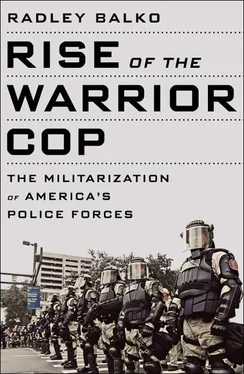The announcement requirement under English law was not a formality, as it has become in police raids carried out today. It was elemental. Its purpose was to give the homeowner the opportunity to avoid violence, distress, and the destruction of his property. A quick knock and announcement in the middle of the night, followed by forced entry ten to fifteen seconds later, before anyone inside can wake, come to the door, and peacefully grant the sheriff entrance, would be only slightly less offensive to the doctrine’s spirit than not knocking at all. As we’ll see, while the US Supreme Court still recognizes the Castle Doctrine, thanks to the modern drug war the Court has all but abandoned this idea that the doctrine should protect homeowners from unnecessary violence—which has historically been the entire reason for its existence.
Not all English legal traditions were carried on in the United States, of course, but the evidence of the Founders’ reverence for the Castle Doctrine is overwhelming. When English authorities began to trample on the principle, the colonists were first moved to protest, then to try to protect themselves through their own courts and legislatures, and finally to openly revolt.
THE REAL CONFRONTATION STARTED IN 1760, WHEN ENGLAND instituted a battery of unpopular taxes and import restrictions on the colonies. Many colonists took to smuggling to avoid paying new taxes on imported goods. The British then responded with heavy-handed laws to move against the smugglers. Then as now, the authorities were required to get warrants before searching private property. But it was the general warrant that infuriated the colonists. General warrants lack specificity. They grant broad authority to search broad groups of people, for evidence of any number of crimes, sometimes over long stretches of time.
The variety of general warrant that Britain used to enforce the import and tax laws on the colonists was called the writ of assistance . The policy had been authorized by the British Parliament in the 1660s, but it was rarely used in England. Beginning in the 1760s, however, it became an effective way to combat smugglers and tax scofflaws. Writs of assistance gave customs officials the power to enter private homes, search for smuggled or untaxed goods, and command other government officials and even private citizens to assist them.
In some ways, the writs were less intrusive than today’s drug warrants. Writs could not be exercised at night, for example, and authorities still had to knock, announce, and allow sufficient time for residents to grant them entrance before breaking down a door. But in other ways writs of assistance granted government officials more sweeping powers than any warrant today. A writ-holder had the power to search any building or residence and confiscate any suspected contraband. And once issued, a writ was essentially permanent—it remained valid until six months after the death of the king in power when it was issued.
The colonists despised the writs, particularly in port cities like Boston, the hub of revolutionary fervor. The Massachusetts legislature banned general warrants in 1756, but that prohibition didn’t stop the English from issuing and enforcing them. Aggrieved Bostonians soon found a champion in James Otis Jr., a blustery Boston attorney who had just resigned as advocate general of the Admiralty Court—the court with jurisdiction over the ships importing goods—in protest against the abuses wrought by the writs. When Otis resigned, began advocating against the writs, and offered free legal representation to anyone who wanted to challenge their legality, he attracted attention, in both Boston and London. 8
In 1761 Otis agreed to represent a group of prominent Boston merchants challenging the writs in Paxton’s Case . The case was likely to be a loser—British law was fairly settled on the matter—but Otis and the plaintiffs hoped to use the case to stir up opposition. When the trial came, Otis used the court proceedings as his platform to deliver an impassioned, wide-ranging, five-hour polemic against the practice of general warrants. In one passage he called writs of assistance “the worst instrument of arbitrary power, the most destructive of English liberty and the fundamental principles of law, that ever was found in an English law-book.”
Otis invoked natural rights, the Magna Carta, and the Castle Doctrine.
Now, one of the most essential branches of English liberty is the freedom of one’s house. A man’s house is his castle; and whilst he is quiet, he is as well guarded as a prince in his castle. This writ, if it should be declared legal, would totally annihilate this privilege. Custom-house officers may enter our houses when they please; we are commanded to permit their entry. Their menial servants may enter, may break locks, bars, and everything in their way; and whether they break through malice or revenge, no man, no court can inquire. Bare suspicion without oath is sufficient.
As expected, Otis lost in court. But his speech likely changed the course of history. One member of the courtroom audience that afternoon was John Adams, a twenty-five-year-old lawyer who would become the second president of the United States of America. Later in his life, Adams recalled the impact that Otis’s speech had on him. He praised Otis’s grasp of history and fiery defense of the rights of man and pointed out that, quite ahead of his time, Otis even declared that black men should be afforded the same rights as white men, including the right to own property. Adams credited Otis and his diatribe against British warrant abuses as the first knocks of the American Revolution. “Every man of an immense crowded audience appeared to me to go away as I did, ready to take arms against writs of assistants,” Adams wrote. “Then and there was the first scene of the first act of opposition to the arbitrary claims of Great Britain. Then and there, the child Independence was born.” 9
Writs of assistance and the customs bureaus that carried them out would be among the specific complaints that the signers of the Declaration of Independence laid out against King George III on July 4, 1776: “He has erected a multitude of New Offices, and sent hither swarms of Officers to harass our people and eat out their substance.” In 1791 the Castle Doctrine was enshrined in the US Constitution when the Fourth Amendment was ratified with the rest of the Bill of Rights. The Fourth Amendment prohibits general warrants at the federal level (the prohibition would later be extended to the states through the Fourteenth Amendment) by requiring that warrants not be issued without reason and probable cause, that they be sworn with an oath and affirmation, and that they include particular information about the place to be searched and the person and items to be seized.
But the Fourth Amendment was just one part of a larger, ongoing debate about how to police and defend the security of a free society. The country was young, untested, and unstable, and it faced hostile threats, both internal and external. Those threats would test early America’s devotion to individual rights and the Enlightenment principles that had animated the fight for independence.
CHAPTER 2

SOLDIERS IN THE STREETS
One of [America’s] greatest strengths is that the military is responsive to civilian authority, and that we do not allow the Army, Navy, and the Marines and the Air Force to be a police force. History is replete with countries that allowed that to happen. Disaster is the result.
—MARINE LT. GEN. STEPHEN OLMSTEAD, IN HIS 1987 TESTIMONY BEFORE THE US CONGRESS
The Third Amendment reads, in full:
Читать дальше














